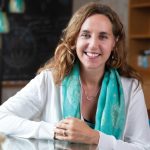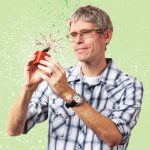Joe & Clara Tsai Foundation launch Human Performance Alliance
enlisting Salk scientists in transformative research
on peak athletic performance
In the News
A Salk team led by Professor Satchin Panda, along with teams from UC San Diego, Stanford University, Kansas University, University of Oregon and Boston Children’s Hospital have been awarded a total of $220 million by the Joe and Clara Tsai Foundation to establish the Human Performance Alliance (HPA). The six organizations will pursue research around four scientific “moonshots” designed at transforming human health on a global scale through the discovery and translation of the biological principles underlying peak athletic performance.
A Salk team led by Professor Satchin Panda, along with teams from UC San Diego, Stanford University, Kansas University, University of Oregon and Boston Children’s Hospital have been awarded a total of $220 million by the Joe and Clara Tsai Foundation to establish the Human Performance Alliance (HPA). The six organizations will pursue research around four scientific “moonshots” designed at transforming human health on a global scale through the discovery and translation of the biological principles underlying peak athletic performance.
By understanding how athletes achieve peak physical performance, injury prevention and recovery, the HPA seeks to improve the health and fitness of all people.
Panda, who holds the Rita and Richard Atkinson chair at Salk, is a world expert in how biological clocks (AKA circadian rhythms) contribute to health or disease. He and the Salk team will map the molecules and gene activity of human performance as part of the alliance’s Molecular Athlete Moonshot.
The Salk moonshot will systematically collect data on the molecular and cellular composition of human and animal body tissues to help understand how various cellular components and systems interact. The point is to build a foundational map that can be used to predict how intrinsic factors (sex, age, menstrual cycle, etc.)—interact with extrinsic factors (diet, exercise, sleep, etc.) to determine physiological performance, injury potential, healing, and recovery. This work is expected to fuel innovations in functional nutrition, personalized training, biomarker discovery and diagnostics, therapeutics, regenerative repair and surgery, and recovery regimens.
In true Salk spirit, multiple Institute faculty will collaborate to integrate laboratory cell cultures and organoids, human samples, animal models, and human data with computational models to identify biological principles governing human physical performance, injury risk and recovery.
These faculty include Professor and Howard Hughes Medical Institute Investigator Joseph Ecker; Assistant Professor Dannielle Engle; and Professors Susan Kaech, Joseph Noel and Alan Saghatelian.
The Ecker lab will work to characterize the epigenetics of tissues and biological samples. Epigenetics are the chemical tags on DNA that turn genes on or off, and help our bodies adapt to changing conditions without altering our fundamental DNA.
The Saghatelian lab will focus on the metabolites produced or consumed by tissues during metabolism, which can change significantly in response to exercise, rest and injury.
The Kaech lab will analyze tissue-resident and circulating immune cells, since immune health is essential for peak performance. Well-coordinated immune cell function is critical for scarless healing, while chronic inflammation or insufficient immune cell activation exacerbates injury.
The Noel lab, which has expertise in biochemistry, will investigate natural compounds that can promote healing and tissue regeneration.
The Engle lab will develop organoid models of muscles, ligaments and tendons.
The Salk team will collaborate with teams at UC San Diego, Stanford University, Kansas University, University of Oregon, and Boston Children’s Hospital to translate scientific findings into practice.
Support a legacy where cures begin.
Featured Stories
 Building a More Resilient WorldThe world is facing an array of health-related crises: COVID-19 and other infectious diseases, climate change, neurodegenerative conditions, cancers and many more. To tackle these daunting challenges, the Institute is embarking on a philanthropic campaign to focus on resilience: the biological adaptability that mitigates the effects of aging, resists disease and restores global wellness.
Building a More Resilient WorldThe world is facing an array of health-related crises: COVID-19 and other infectious diseases, climate change, neurodegenerative conditions, cancers and many more. To tackle these daunting challenges, the Institute is embarking on a philanthropic campaign to focus on resilience: the biological adaptability that mitigates the effects of aging, resists disease and restores global wellness. Susan Kaech – How T cells rememberSalk Professor Susan Kaech, director of the NOMIS Center for Immunobiology and Microbial Pathogenesis, has made it her mission to gain a better understanding of how T cells form, how they exchange molecular signals with the surrounding tissue, and how we can use this knowledge to prevent or treat infections.
Susan Kaech – How T cells rememberSalk Professor Susan Kaech, director of the NOMIS Center for Immunobiology and Microbial Pathogenesis, has made it her mission to gain a better understanding of how T cells form, how they exchange molecular signals with the surrounding tissue, and how we can use this knowledge to prevent or treat infections.
 Carl Procko – Lessons from carnivorous plantsStaff Scientist Carl Procko studies Venus flytraps and their close relatives, Sundew plants, to gain insight into the ultra-fast biochemistry of plants and how they can sense touch. It doesn’t hurt that these bug-eating plants are a great way to get kids—and adults—interested in science.
Carl Procko – Lessons from carnivorous plantsStaff Scientist Carl Procko studies Venus flytraps and their close relatives, Sundew plants, to gain insight into the ultra-fast biochemistry of plants and how they can sense touch. It doesn’t hurt that these bug-eating plants are a great way to get kids—and adults—interested in science. Nuttida Rungratsameetaweemana – Drawing from memoriesNuttida Rungratsameetaweemana, a Salk postdoctoral researcher who studies neuroscience, was introduced to the perplexities of the brain at age 14 during a chance encounter in a hospital waiting room.
Nuttida Rungratsameetaweemana – Drawing from memoriesNuttida Rungratsameetaweemana, a Salk postdoctoral researcher who studies neuroscience, was introduced to the perplexities of the brain at age 14 during a chance encounter in a hospital waiting room.




















































